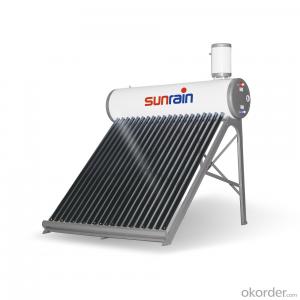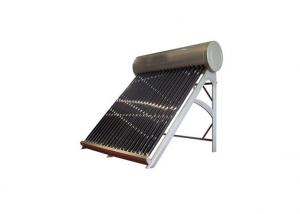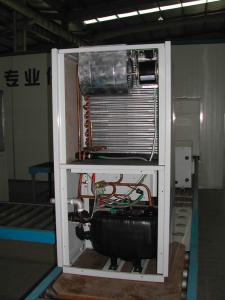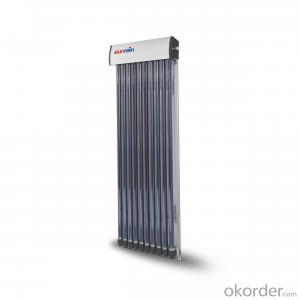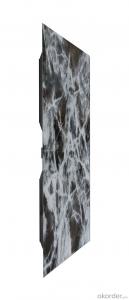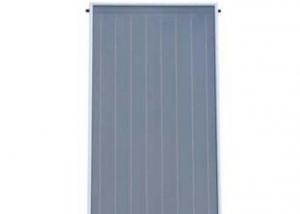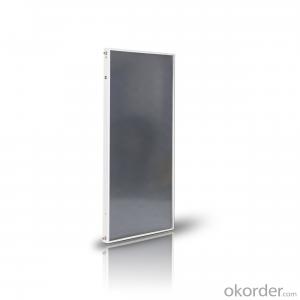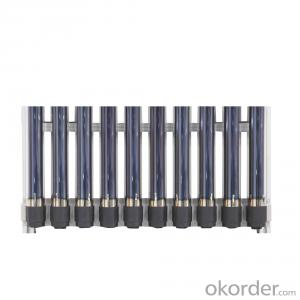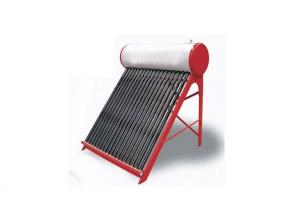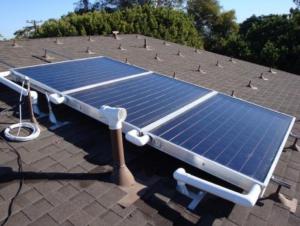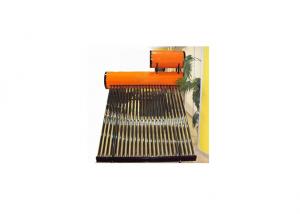Non-pressure project collector
- Loading Port:
- China Main Port
- Payment Terms:
- TT OR LC
- Min Order Qty:
- -
- Supply Capability:
- -
OKorder Service Pledge
OKorder Financial Service
You Might Also Like
* Frame: coated galvanized steel, special triangle design, strong and practical.
* Using professional test system including equipment imported from German to guarantee the quality of the whole solar system.
* Different specifications to meet the requirement of different building conditions. Easy installation, small area
* Environmentally friendly, small investment with huge payback. Flexible combination and convenient operation according to customers' requirement help to reduce the cost. It only takes 3-5 years to recoup the cost and is long-term beneficial. More economic that gas and electric heating system
* Natural circulation without pumps. More economic
* Suitable for big project, more widely used in school, office, manufactory factory, breeding room, electroplating factory, fermenting factory, food factory and other hot-water-needed factory.
* The heat exchange efficiency of U pipe collector is better than that of heat pipe.
- Q:Can a solar water heater be used in areas with high pollution levels?
- Yes, a solar water heater can still be used in areas with high pollution levels. While high pollution levels may slightly reduce the efficiency of the solar panels due to reduced sunlight reaching the surface, solar water heaters can still function and provide hot water. However, regular cleaning and maintenance of the panels may be required to ensure optimal performance in polluted areas.
- Q:How does the size of a solar collector affect the performance of a solar water heater?
- The performance of a solar water heater is greatly influenced by the size of its solar collector. When the collector is larger, it provides a larger surface area for solar radiation absorption, resulting in more heat being transferred to the water. As a result, a larger collector can efficiently heat a larger volume of water, producing a higher hot water output. Furthermore, a larger collector size enhances the overall efficiency of the solar water heater. With its increased surface area, the collector can capture more sunlight and convert it into heat energy. This enables a larger collector to generate higher temperatures, even in colder weather conditions, and operate more effectively in areas with less intense solar radiation. Additionally, the size of the solar collector impacts the duration of heat retention. A larger collector can store more heat energy, allowing for a longer availability of hot water, especially during periods with limited solar radiation, such as cloudy days or at night. Nevertheless, it is crucial to maintain a balance between the size of the solar collector and the demand for hot water. If the collector is excessively large for the water heating requirements, it may result in excessive heat production and wasted energy. Conversely, if the collector is too small, it may struggle to efficiently meet the hot water demand. In conclusion, the size of the solar collector plays a critical role in determining the performance of a solar water heater. A larger collector size offers advantages such as increased heat absorption, higher temperatures, and longer heat retention, ultimately leading to improved efficiency and hot water output. However, it is vital to find the appropriate balance between collector size and hot water demand to ensure optimal performance and energy utilization.
- Q:Can a solar water heater be used in areas with limited access to energy conservation programs?
- Yes, a solar water heater can indeed be used in areas with limited access to energy conservation programs. Unlike traditional water heaters that rely on electricity or gas, solar water heaters operate solely on sunlight, making them a sustainable and efficient choice for areas with limited energy resources. They can significantly reduce energy consumption and costs, providing a reliable and environmentally friendly solution for heating water even without access to energy conservation programs.
- Q:Solar water heater can produce a lot of hot water a day
- The first to look at its capacity, second to see the sun's intensity, the temperature of the hot water you want to see the third
- Q:What is the impact of nearby vegetation on the performance of a solar water heater?
- Nearby vegetation can have both positive and negative impacts on the performance of a solar water heater. On one hand, the presence of vegetation can provide shade, which can help to keep the solar panels cooler and prevent overheating. This can improve the efficiency and longevity of the system. Additionally, some types of vegetation, such as trees, can act as windbreaks, reducing heat loss due to wind. On the other hand, if vegetation is too dense or located too close to the solar panels, it can block sunlight and reduce the amount of energy captured by the system. This can result in decreased performance and lower water heating capabilities. Moreover, if vegetation is not properly maintained, it can accumulate debris, such as leaves or branches, which may obstruct the panels and hinder their efficiency. Overall, it is crucial to strike a balance between having some nearby vegetation to provide shade and wind protection, while ensuring that it does not obstruct or shade the solar panels excessively to maximize the performance of a solar water heater.
- Q:Can a solar water heater be used in areas with limited access to water resources?
- No, a solar water heater requires access to sufficient water resources in order to function effectively.
- Q:Can a solar water heater be installed in urban areas?
- Yes, a solar water heater can be installed in urban areas. In fact, urban areas often have rooftops and open spaces that are suitable for installing solar panels to harness solar energy. Additionally, solar water heaters can be integrated into existing plumbing systems, making them a viable option for urban dwellings.
- Q:Can a solar water heater be used in areas with water scarcity?
- Yes, a solar water heater can still be used in areas with water scarcity. Solar water heaters utilize the sun's energy to heat water, reducing the reliance on other water sources such as gas or electricity. As long as there is some water available, solar water heaters can effectively heat it, making them a suitable option for areas facing water scarcity.
- Q:How does the efficiency of a solar water heater change with age?
- The efficiency of a solar water heater may decrease with age due to wear and tear on its components, such as the collectors or the heat transfer fluid. Over time, the system may become less effective at capturing and converting solar energy into heat, resulting in lower overall efficiency. Regular maintenance and replacement of worn-out parts can help mitigate this decline and sustain the efficiency of the solar water heater.
- Q:What is the warranty period for a solar water heater?
- The warranty period for a solar water heater typically ranges from 5 to 10 years, depending on the manufacturer and model.
1. Manufacturer Overview |
|
|---|---|
| Location | |
| Year Established | |
| Annual Output Value | |
| Main Markets | |
| Company Certifications | |
2. Manufacturer Certificates |
|
|---|---|
| a) Certification Name | |
| Range | |
| Reference | |
| Validity Period | |
3. Manufacturer Capability |
|
|---|---|
| a)Trade Capacity | |
| Nearest Port | |
| Export Percentage | |
| No.of Employees in Trade Department | |
| Language Spoken: | |
| b)Factory Information | |
| Factory Size: | |
| No. of Production Lines | |
| Contract Manufacturing | |
| Product Price Range | |
Send your message to us
Non-pressure project collector
- Loading Port:
- China Main Port
- Payment Terms:
- TT OR LC
- Min Order Qty:
- -
- Supply Capability:
- -
OKorder Service Pledge
OKorder Financial Service
Similar products
New products
Hot products
Related keywords
